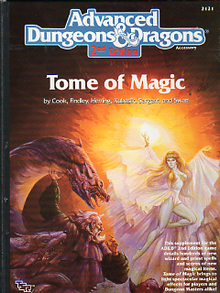Tome of Magic: Pact, Shadow, and Truename Magic
 |
|
| Author | David Cook, Nigel Findley, Anthony Herring, Christopher Kubasik, Carl Sargent, and Rick Swan |
|---|---|
| Genre | Role-playing game |
| Publisher | TSR |
|
Publication date
|
1991 |
| Media type | Print (Hardback) |
 |
|
| Author | Matthew Sernett, Ari Marmell, David Noonan, and Robert J. Schwalb |
|---|---|
| Genre | Role-playing game |
| Publisher | Wizards of the Coast |
|
Publication date
|
March 2006 |
| Media type | Print (Hardback) |
| Pages | 288 |
| ISBN | |
Tome of Magic (abbreviated ToM) is a handbook of rules and guidelines for the Dungeons & Dragons role-playing game. As its name implies, it is a supplement to be used to expand the magical options available in the game. It was first released for Advanced Dungeons & Dragons, 2nd Edition, and the name was reused for a book released for the 3rd Edition of D&D.
The 2nd Edition Tome of Magic, published in 1991, was a book focused upon expanded options for members of the mage and cleric classes and their subclasses. It also introduced the concept of metamagic effects to D&D. The book was arranged in several sections, designed by David Cook, Nigel Findley, Anthony Herring, Christopher Kubasik, Carl Sargent, and Rick Swan. Cover art is by Jeff Easley, with interior illustrations by Stephen Fabian, Brom, Clyde Caldwell, Carol Heyer, John and Laura Lakey, and Roger Loveless.
This AD&D game hardcover includes 86 new wizard spells (plus rules for "wild mages"), 170 priest spells (plus eight new spheres), and 92 new magical items, all meant to fill minor gaps in the extant spell lists.
The first section presented new subclasses for the mage class, and new forms of spells and spellcasting for the cleric class, as well as several new spheres of divine magic. The mage subclasses were the wild mage and elementalist classes. The wild mage had the most in the way of new rules, including wild magic and wild surges, which result from his attempts to use magic in raw, barely controllable forms. Elementalists had to devote themselves to one of the four classical elements, barring them from using spells employing their oppositional element (fire vs. water, or air vs. earth, for example), but gaining increased power in exchange.
...
Wikipedia
